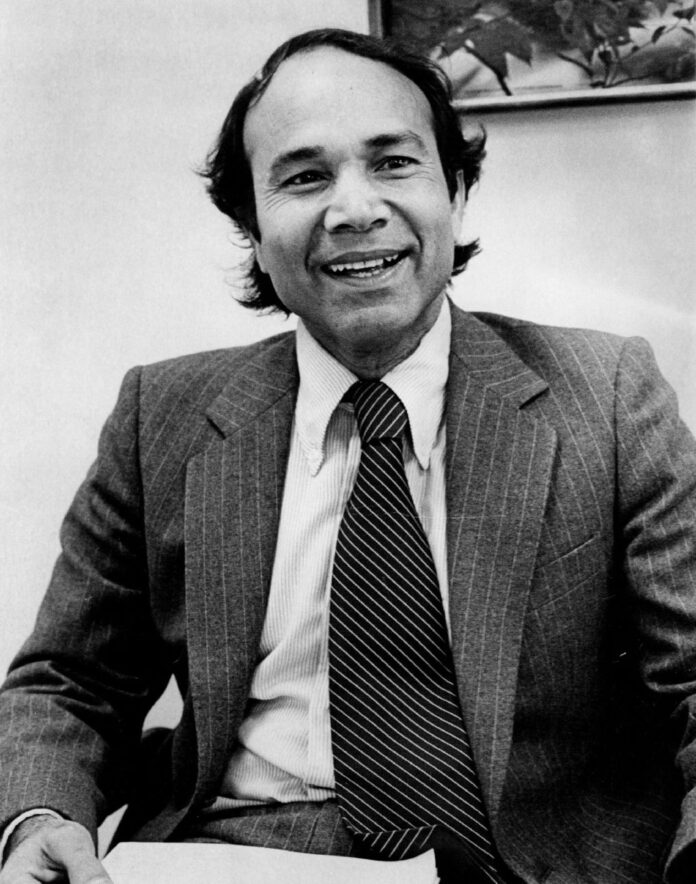For more than 30 years, Ved Nanda inspired the humanitarian spirit in Denver Post readers with his regular columns.
Nanda’s practical, easy-to-read style often made his strong opinions on international conflicts and travesties land softly among readers as a plea for humans to simply coexist in peace. His technical understanding of international policy and law, however, added great depth to his work for those working in field who were looking for a moral guide.
Nanda wrote not only to inform Denver Post readers but also to push on those with power for crucial changes – eliminate nuclear weapons, end Africa’s brutal civil wars, close Chinese detention camps for Uighurs, and give women in Afghanistan and Saudi Arabia equal rights. The list could go on.
Sadly, Nanda’s voice could not go on forever. Nanda, 89, died on Monday, Jan. 1, in Denver surrounded by friends and family. He was preceded in death by his wife of 41 years, Katharine, in August. Katharine helped Nanda with both is writing and research.
Nanda was tireless in pursuing justice and peace for moral and personal reasons.
His seminal work for The Denver Post was his 2017 reflection on India’s partition. At the time, Nanda was a young child, fleeing for his life at his mother’s side. As a Hindu family in Gujranwala, a Muslim-majority town in Punjab, it was a Muslim neighbor who helped the Nandas escape neighbors who had overnight turned into “animals,” indiscriminately killing any Hindus who remained. Muslims in east Punjab faced a similar fate as violent mobs forced them into what would become Pakistan.
We don’t have to guess at what inspired Nanda’s work: “As I look back at the 70th anniversary of India’s partition, it is perhaps this experience which has given me the lifelong purpose to work for peace and human rights, especially for refugees. I firmly believe that humans must not turn into animals.”
His voice for peace will be dearly missed in a world beset with anger and violence, where Ukrainians, Russians, Ethiopians, Yemenis, Israelis and Palestinians are dying in droves. In a world where journalists can no longer freely travel to places once safe, like Russia, China and Saudi Arabia. In a world where women in Afghanistan and Iran are more marginalized than ever. We need more men and women like Nanda who follow a clear moral compass toward peace.

Nanda was not just an international advocate for peace; he was also the living embodiment of a humble spirit offering kindness and care to his fellow humans. The man had accolades to spare — after 50 years of teaching at the University of Denver and decades of work on humanitarian causes with the United Nations and other international forums. He founded DU’s international legal studies program in 1972, and in 2006, he founded and led the Ved Nanda Center for International and Comparative Law. In 2016, he received the Hiroshima Peace Prize. In 2018 he was presented with the Padma Bhushan, one of the highest civilian awards, by the then-president of India, Ram Nath Kovind.
And yet every phone call was marked by inquiries after family and concern for the well-being of others. He frequently implored me not to work so hard, even as he continued to write a monthly column right up to his death. Colleagues at The Post remember him as a sweet and graceful soul who listened first before sharing his stories of his many trips with Katherine, his pride for his daughter, Anjali, 39, and his two grandchildren.
Anjali Nanda started her career as a refugee officer for the Department of Homeland Security.
“We got to travel with him all over the world while he was teaching,” she said. “He always burned into us that we traveled to experience other cultures and other places and perspectives … The world would be a better place if we would be able to embrace and love people despite our differences.”
Nanda’s motto was “world peace through wine and cheese,” Anjali said, remembering that her father would light up a room in any social setting.
Nanda also leaves a legacy of students whom he either taught directly or who studied in the rich program for international politics he created at DU. These students are now spread across the globe but tied together by their time at the Nanda Center.
Ved and Katherine leave a scholarship fund behind to keep the cycle of learning and understanding going in Denver. In a sense, his one voice calling for peace has become many working across the world.
Megan Schrader is the opinion editor of The Denver Post.



